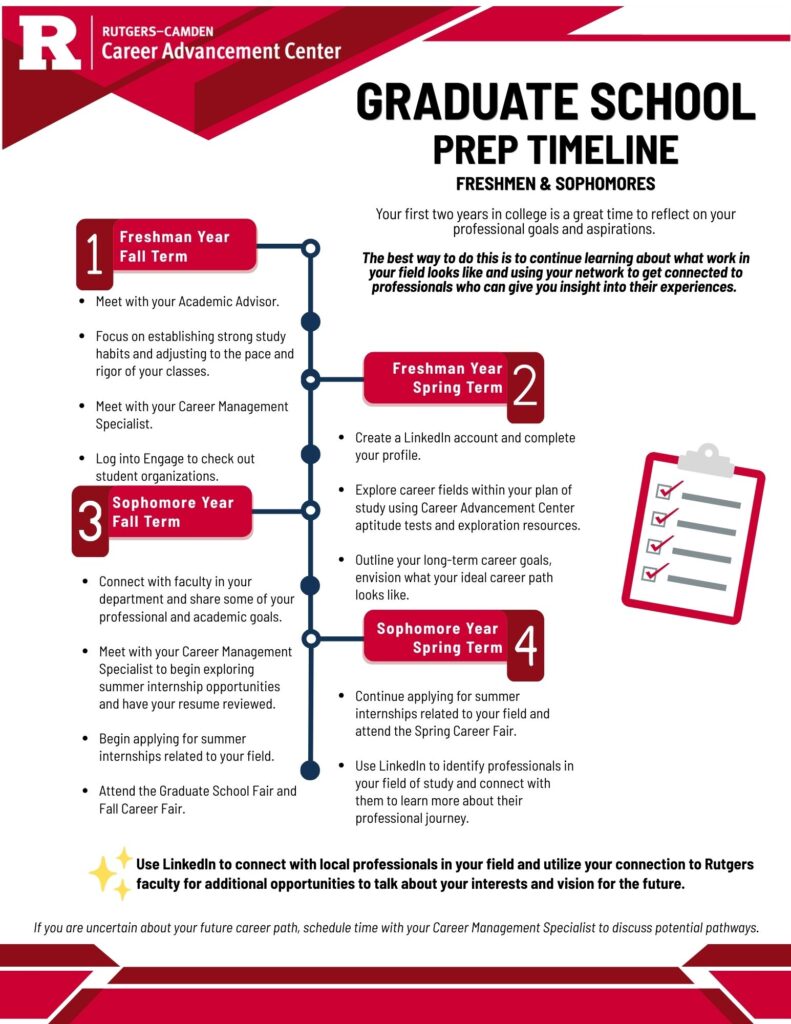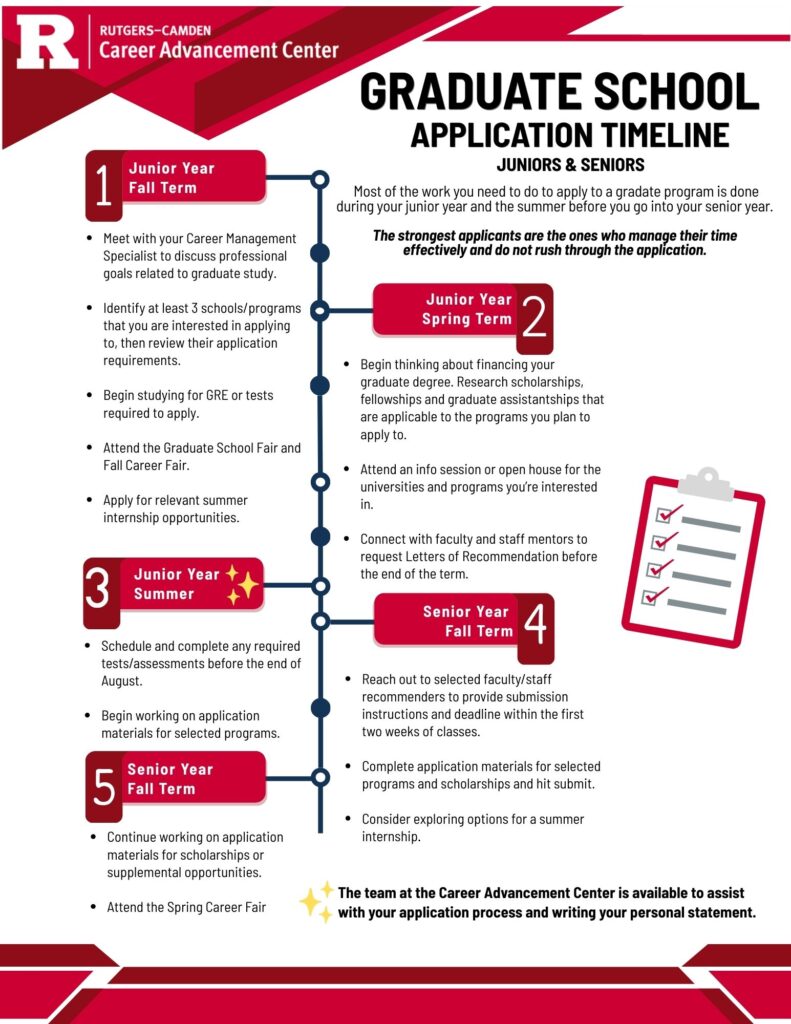Why Attend Graduate School | Where to Attend | Financing Your Graduate Study | Application Procedures | Writing the Graduate Admissions Essay | Career Advancement Center Resources Available to Assist You
Deciding to attend graduate school is very much like writing a paper. You need to consider the who, what, where, when, why, and how. Below are some tips to get you started. Appointments are strongly encouraged, and can be made by calling (856) 225-6046.
Why Attend Graduate School?
- Determine your rationale – Why are you pursuing an advanced degree?
- Discover how graduate study will help you develop your abilities and achieve your goals.
- Decide if a graduate degree is a necessary prerequisite to entering your chosen career.
- Evaluate your motivation to explore your specialty area in detail.
- Become familiar with the careers held by graduates with degrees in your interest area.
- Discuss your plans with a Career Advancement Center staff member, professors, and alumni who either are pursuing or have completed graduate programs in your chosen field.
Where to attend?
There are many factors that go into choosing a university.
- Select a school offering the specialization you seek.
- The quality of the program —is the program accredited and by whom?
- The faculty/student ratio.
- The average GPA and test scores of the last admitted class.
- Whether the course offerings provide you the information and knowledge you want to gain.
- Educational and professional background of the faculty.
- The environment: What is the size? Urban or rural? Are there sufficient recreational possibilities? How’s the climate?
- Opportunities to work or pursue an internship / practicum experience.
- Strength of library.
- Adequacy of lab or studio space and equipment.
- Availability of career and student advisement services.
Financing Your Graduate Study
- Look into financial aid opportunities – loan, assistantship, fellowship, scholarship, internship, or research options.
- Communicate directly with schools regarding the correct process and deadlines for applying and the correct forms for all types of aid. Each institution is unique in their financial aid packages.
- The Best Scholarships for the Best Students, by Donald Asher, Jason Morris, and Nichole Fazio-Veigel.
- UCLA’s Graduate & Postdoctoral Extramural Support (GRAPES) Database – An open resource for all students.
- Funding the Humanities PhD: The Grad Student’s Guide to Grants & Fellowships [Kindle Edition], by J. Martin, PhD
- Foundation Grants to Individuals by Foundation Center (an annual resource)
- Annual Register of Grant Support by Beverley McDonough and Daniel Bazikian
- finaid.org
- fastweb.com
- FAFSA: www.fafsa.com
- Grants.gov ($500 billion in funding)
- National Institute of Health: Grants and Funding
- National Science Foundation: Funding
Application Procedures
- Begin the process the summer before senior year.
- Early applications can be an advantage because most schools have rolling admissions.
- Make sure you have all the admissions requirements.
- Take the required entrance examinations and visit schools.
- If a resume or curriculum vitae (CV) is required, get your document critiqued by the Career Advancement Center.
- Write your admissions essay and have it critiqued at the Career Advancement Center.
- Obtain recommendations from faculty or professionals.
- Submit completed applications early to mid-fall and follow-up with a phone call to ensure your application is complete.
Writing the Graduate Admissions Essay
Most graduate school and fellowship applications require a personal statement or essay. Some programs provide prompts or questions, but the majority require you to outline your reasons for attending a graduate or professional program. Your essay must be a clear, concise, and thoughtful statement. It is the only indication, other than grades, test scores and recommendations, of your potential; it is also a great chance to further outline your relevant experiences and how you match the program’s qualifications. The personal statement can make the difference between you and an equally qualified candidate being admitted. The following are tips to help you get starting writing your essay.
- Description of the Development of Intellectual Interests during College: Discuss your purpose in going to graduate school and what contributions to your field you are interested in making. A sober, realistic and honest account should be presented. Don’t be overly idealistic. Cite courses, professors, books, programs, discussions, etc… that have contributed to your intellectual growth. Avoid being too general. Most graduate schools are concerned with specific interests, mainly those that have research potential.
- Mention why you want to attend that particular graduate program, the research that is done there, a member of the faculty with whom you wish to work, the scope of the department, the programs offered—state why it appeals to your specific interests and needs. The school’s website is an excellent source of information.
- Discuss college and outside activities that have been significant in your personal and intellectual growth, internships, summer or part-time jobs, undergraduate research, volunteer experience, etc. State your eventual goal in terms of degree and career.
- Enclose a particularly good paper, research project or research proposal which may aid a graduate admissions committee in evaluating you especially if your academic record is not as strong as might be required for the program.
Have your essay critiqued by Career Advancement Center staff by dropping it off at the Career Center, Lower Level of the Campus Center or by e-mailing to careercenter@camden.rutgers.edu.
Essay review requests must be made a minimum of 2 weeks before the final draft is needed.
Career Center Resources Available to Assist You
Web Resources:
- Rutgers Camden Graduate Admissions
- Rutgers University Libraries – Education and Training
- Peterson’s Guides to Graduate Schools
- U.S. News & World Report Best Graduate School
- The Official Guide to US Law Schools
- MBA Program Directory
- Access to the Rutgers Graduate Funding database
- More Graduate School Rankings – From the University of Illinois, information about school rankings, and links to ranking sites, as well as a bibliography of additional information sources on rankings.
Career Management Specialists will help you with all of the above! Make an appointment by calling (856) 225-6046.
TIMELINES TO CONSIDER


